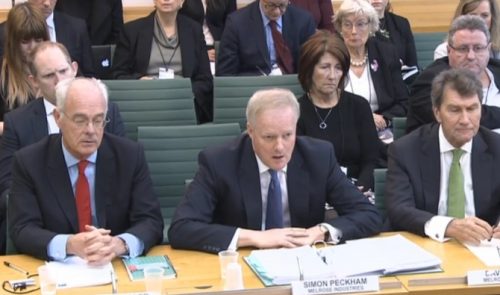MPs demand assurances GKN pensioners will be provided for under Melrose ownership

MPs have demanded further assurances from turnaround specialist Melrose that it is the best suitor to take control of engineering giant GKN.
Representatives from GKN, Melrose and trade union Unite all outlined their roles in the takeover saga during a hearing of the Business, Energy and Industrial Strategy select committee, convened to hear evidence on what could happen should Melrose take ownership of GKN.
Rachel Reeves, chair of the BEIS committee, said: “We heard Melrose’s broad strategy for GKN but it was light on specifics about the future of the business. For shareholders, workers and pension holders, Melrose should do more than point to its track record with smaller acquisitions.
“Melrose should set out their plans for applying for clearance from the Pensions Regulator and the areas in which they would be willing to consider making formal post-offer undertakings regarding their future plans for the business.”
Many of the MPs on the select committee are also involved in the joint inquiry with the Work & Pensions select committee on the collapse of Carillion, therefore they are highly sensitive towards pensions provision and what the fate of workers would be post any takeover.
To try and allay fears that Melrose might not be the right suitor for GKN, the board trio promised to notify MPs further about its plans regarding pensions provision and a commitment to research and development spending once any takeover was completed.
It emerged that Melrose had yet to seek clearance from the Pensions Regulator in regard to its proposed takeover.
A letter from the Pensions Regulator, published by the select committee stated: “From the outset we have been concerned that the increased leverage involved in the proposed takeover by Melrose is likely to have a detrimental impact on covenant.”
However, it added that confidentiality provisions meant it could not disclose the issues publicly.
The Melrose trio also agreed to schedule a meeting with unions representing the GKN workers so they could outline their plans for the future of the business.
Simon Peckham, co-founder and chief executive of Melrose, said the company remained interested in GKN because of it was a great business but one that had lost its way.
He said Melrose believed that it could turnaround the company’s fortunes, much as it had done with our businesses in its portfolio.
However, this would not be without casualties.
He said it was likely that the GKN board would be disbanded and responsibility for running the business handed to its management.
The typical Melrose acquisition strategy is to acquire a business, restructure it, make it profitable and sell it on again, usually within three to five years.
Mr Peckham outlined this strategy had been successful with its former acquisition of Elster, which it went on to sell to Honeywell in 2016 for £3.3bn.
However, he admitted that GKN – for which it has bid £7.4bn – would be largest takeover to date.
He revealed that Melrose had secured a £4.5bn banking facility to finance its plans. Of this, it said it would set aside £1bn to act as headroom for the proposed takeover.
The £7.4bn offer would comprise 80% of Melrose shares with the remainder being borrowed.
The company has pledged to lay aside £150m to inject into the GKN pension scheme.
The committee heard earlier from GKN chief executive, Anne Steven, and group finance director, Jos Sclater.
Mr Sclater told MPs the company was concerned about Melrose’s ‘short-termism’ and what that could mean for the vital research and development work conducted by automotive and aerospace businesses.
He said such was the nature of contracts in industries such as aerospace that plans had to be implemented 10 to 15 years in advance of when then would be operational.
He said the GKN investment strategy was to “invest for our grandchildren”.
Representatives from Unite said they were concerned that Melrose’s plans were merely asset-stripping and it had major concerns for the future of the company’s 32,000 pensioners.








